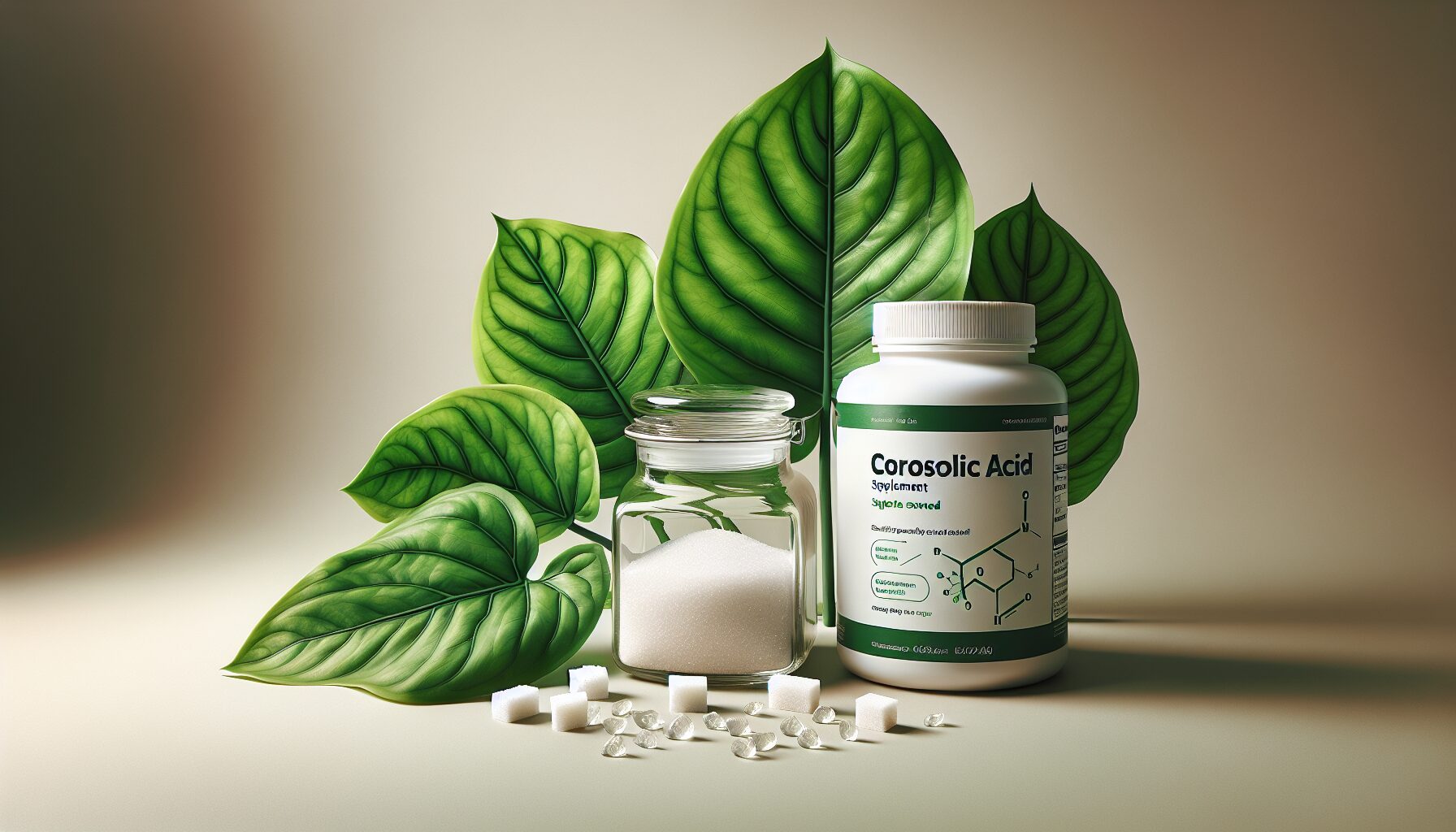
Corosolic Acid Benefits
Corosolic acid supplements are not widely available, with the benefits of this active plant triterpenoid compound only just being understood by modern nutritional research. Ursolic acid is another plant phytochemical which forms and is structurally similar to corosolic acid, so shares many potential benefits. Ursolic acid is a really strong antioxidant, which also has potential health benefits. You can read about ursolic acid, ursolic acid supplements and its potential health benefits here. Both of these plant compounds are trending in the wellness community.
Corosolic acid is found in large amounts in the banaba plant. You generally find corosolic acid supplements as part of banaba extracts. Banaba is a tree native to Asia that has been considered to carry potential medicinal benefits from its leaves. The leaves of the banaba tree have been used for centuries in the treatment of diseases in Eastern cultures. So far human trials have been shown to elicit no adverse effects. Banaba extracts are also considered to be a traditional remedy for diabetes.
Corosolic acid is considered to be one of the main active compounds in banaba. Corosolic acid is thought to have positive effects on the use of glucose by the body. Of course, the metabolism of glucose is influential in the body, with potential downstream health benefits that could include improved gym performances and reduced risk of diabetes. Corosolic acid is thought to have other potential benefits including reductions in inflammation and a reduced risk of cancer.
In this article, we will look at corosolic acid and some of the potential health benefits that modern research is beginning to unveil from its activity within the body.

Heart Health Benefits Of Corosolic Acid
One of the main potential benefits of corosolic acid, identified from some of its activities on body systems, is its ability to positively influence heart health. Most studies with corosolic acid have been with animals and have identified this compound as a cardioprotective phytochemical. This means it protects the overall wellbeing and functioning of the heart.
Mild corosolic acid treatment seemed to influence heart health through reducing heart cell damage. These effects were significant and were mediated by an increase in body antioxidant levels. This triggered a response within the heart that is protective of heart tissue. Because of how active the heart is, antioxidants are required regularly to ensure that the cells are protected from the damage that could accumulate from cellular metabolism. As an antioxidant compound, corosolic acid helps to maintain heart cells in a state that is healthy and more optimal for their function.
This could have benefits for sufferers of diabetes. One secondary issue of diabetes is the development of heart problems and oxidative stress from excess glucose levels in the body. This condition can generate reactive oxygen species at higher levels than usual, putting the heart under strain, which as we’ve mentioned can also damage particularly vulnerable heart tissues. Diabetes may generate very reactive superoxides at much higher levels than others. These damaging free radicals can cause other issues too, like increased cancer risk from genetic mutations or elevated levels of inflammation within the body. Where there damage from reactive oxygen species, proinflammatory cytokines are also released and this could also add to risk of heart cell damage.
Corosolic acid may help to improve antioxidant levels in the heart and therefore may have benefits to diabetics who are at a higher risk of damage to heart muscle tissues.

Glucose Metabolism Benefits
Clearly having optimal levels of glucose metabolism and antioxidant support of your metabolism is extremely important. Another potential benefit of corosolic acid is more optimal glucose metabolism.
Corosolic acid seems to have incredible effects on glucose metabolism, significantly reducing blood sugar levels in just an hour. These glucose level reductions are remarkable, bringing blood glucose levels a lot closer to healthy and optimal levels for the body. Corosolic acid could therefore also have more benefits for sufferers of diabetes or those at risk of diabetes. It is no wonder that corosolic acid is known by many researchers as plant insulin.
Much of this effect could be considered to be because of the antioxidant support that corosolic acid may provide during metabolism. Raises in antioxidant levels are also observed with corosolic acid supplementation and these support optimal energy production from our mitochondria. Corosolic acid also improves mitochondrial functioning, via healthy mitophagy and through reduced oxidative stress.
Corosolic acid may also reduce gluconeogenesis and help to regulate lipid metabolism. These support the idea that corosolic acid encourages optimal metabolism in the body, reducing the need for extra energy production. Corosolic acid could also interact with insulin receptors and glucose intake receptors, which would improve glucose intake or metabolism.
These specific glucose intake receptors seem to be found in larger amounts in brain cells, which would experience a higher glucose level than previously. It may be that higher mitochondrial energy production rates, as during exercise, trigger added glucose receptors to fuel their needs from inside cells. Studies suggest that corosolic acid may have anti-inflammatory and neuroprotective effects.

Effects On Weight Management
Because of its effects on glucose use in the body, corosolic acid may also have benefits in managing appetite and optimal weight management to enhance healthy weight loss.
Some studies have looked into this and support that corosolic acid could enhance weight loss, while increasing leptin or hormone levels for fullness. One study found an average weight loss of up to 3kg per person with 10mg of corosolic acid rich banaba extract after 2 weeks.
Studies also show that corosolic acid and corosolic acid rich banaba extracts may also have benefits in supporting metabolic syndrome or mild metabolic issues. Corosolic acid may also inhibit adipogenesis, or the production of fat tissues, while improving HDL levels.
These present other potential health benefits of corosolic acid for diabetics or those at risk of developing diabetes. Diabetics are very sensitive to glucose levels and the inflammatory effects of fat tissue accumulation.
Corosolic Acid And Cancer
Corosolic acid can improve antioxidant levels in the body and it also has its own antioxidant capacity. Therefore it may also help to support with the prevention of cancerous growths from developing. Some studies also found that there were reduction in cancer tumour cell growth with corosolic acid use.
Corosolic acid is being looked at as a preventative and possible treatment for certain cancers. It certainly seems to be implicated as an interceptor of pro-inflammatory pathways in the body. Corosolic acid may restrict detrimental cancer cell signalling and prevent cancer cell metastasis, which are important cancer pathologies. Metastasis is where cancer cells spread in the body.
Corosolic acid could indirectly act at the DNA level, inhibiting cancer cell DNA synthesis, to prevent cancer cell growth. At the right concentrations, corosolic acid causes bladder cancer cell death through mitophagy, where aged mitochondria are removed. It may also support healthy liver tissue regeneration, while suppressing tumour growth.
These could be other potential benefits of corosolic acid and relevant corosolic acid extract supplements. Whether corosolic acid can be used to treat cancers needs a lot more research.

Immune System Support
Corosolic acid could support the immune system through anti-microorganismal effects, including some anti-viral activities and anti-fungal properties. There are various studies that show that corosolic acid may have anti-biofilm activity and inhibits the growth of S. aureus. Corosolic acid may share antibacterial activity with ursolic acid against MRSA. This is one means as to how corosolic acid would potentially support the immune system against pathogens.
Antioxidants have an ability to support the activities of one another within the body. Having elevated levels of antioxidants may actually boost levels of other antioxidant vitamins like vitamin C. Vitamin C is an important immunomodulating vitamin that improves immune cell functioning and activities. So, higher corosolic acid levels could conserve vitamin C in the body.
Through both of these actions, corosolic acid could support more optimal immunity. Higher vitamin C levels also improve levels of natural T-killer cells which target and remove cancerous cells. This effect on the immune system therefore compliments its potential to protect the heart from damage, cancer preventative actions and also its anti-inflammatory abilities.

Summary
Corosolic acid is considered to be one of the main active compounds in banaba and may have health benefits. Banaba extracts are used as a traditional remedy for diabetes.
Corosolic acid is thought to be a mild cardioprotective compound with potential benefits to heart health. It has been shown to reduce damage to heart cells through improved antioxidant levels. While corosolic acid seems to protect mitochondrial health via mitophagy, a process where unhealthy or aged mitochondria are removed from the body. This is important for diabetics who could suffer from higher levels of oxidative stress and heart tissue damage.
Corosolic acid seems to have incredible effects on glucose metabolism. It significantly reduced blood sugar levels in an hour, which other studies have also confirmed. This is one reason why corosolic acid has been called, plant insulin.
Corosolic acid supports optimal glucose use through antioxidant metabolic support, healthy mitophagy and glucose intake receptor increases. There are reports that corosolic acid could enhance healthy weight loss because of its effect on glucose use and blood glucose levels.
Corosolic acid may also have anti-inflammatory and neuroprotective effects. Because of effects on cancer cell signals and tumours, corosolic acid may be preventative on some cancers. It may inhibit cancer cell DNA synthesis, while it can support liver cell regeneration and suppress tumour growth. Corosolic acid could also support the immune system through anti-microorganismal and indirect immune boosting effects from its antioxidant abilities.
Corosolic acid may have potential benefits throughout the body from heart protective benefits to more optimal glucose use by the body, which may support diabetic outcomes.
For more interesting articles, see the main articles page below.





